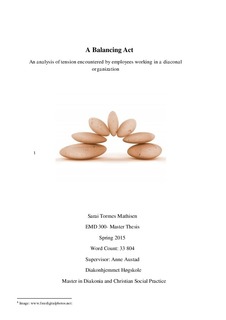| dc.description.abstract | The purpose of this study is to explore tension that occurs in a diaconal organization among its employees due to the difference in religious values between the organization, the employees, and the clients who benefit from the organization’s services. In this case, Nadheim, a diaconal project of Kirkens Bymisjon that offers services to persons with prostitution experience will be the focus because of the many different religious or moral beliefs that are held by employees and clients. One of the persons interviewed for this project brought up the purpose for researching this specific type of organization, “…in many other job situations personal faith would not be an issue.”2 However, in a diaconal organization, faith is a part of the foundation for the work and sometimes it collides with the worldviews of employees who have been entrusted with caring for clients who also have their own specific beliefs. The research question in this study is: What kind of tension exists or has occurred among Nadheim employees because of the Christian values held by Kirkens Bymisjon and the Christian, non-religious, or other religious values held by employees and clients? This research question is answered through the analysis of eight qualitative interviews, which include an interview with the general manager, assistant manager, and six of the employees at Nadheim. The research was conducted using a hermeneutical approach, which places emphasis on the particular context where the data was gathered. Therefore, this thesis provides thorough background information about Nadheim. The results of the study identified three different types of tensions at Nadheim: tension from above, within, and below. These tensions are related to the work of human service organizations, negotiation, the expression of diaconal values, and modern pluralism. The desire is that through this study there will be more dialogue in diaconal institutions about how organizations, employees, and clients can find ways to cooperate but that also clarity will remain regarding the purpose of the work. | nb_NO |
